Creating a salon-worthy blowout at home isn’t easy, but there are a variety of tools that can help you out, including curling wands, hair straightening brushes or, the most versatile of them all, flat irons. With a flat iron, you can straighten or curl your hair and create beach waves or flippy ends, among several other popular looks. Flat irons also save you some space when traveling since they can perform the same functions as a round brush or curling iron.
SKIP AHEAD Best flat irons to shop | Ceramic vs. tourmaline vs. titanium flat irons | How to shop for a flat iron | Do flat irons damage hair?
When used properly, “a flat iron provides sleeker, longer-lasting looks that smooth the cuticle [and] locks in the style with minimal tension and less repetitive passes on the hair fibers,” says Bridgette Hill, a certified trichologist and scalp expert.
To help you find the best flat iron for your hair type, we spoke to experts and hair stylists about what to know about flat irons and how to protect your hair from heat damage. We also gathered their recommendations for the best flat irons to shop.
Our picks
How we picked the best flat irons
When shopping for a flat iron, our experts recommended looking at the following factors:
- Plate type: The three main types of flat iron plates are ceramic (more affordable and good for dry, damaged or fine hair), tourmaline (good for all hair types) and titanium (most durable and good for coarse thick, curly and coily hair).
- Plate size: Most flat iron plates are available in sizes between 1 inch and 2 inches (our experts recommended going no larger than 2 inches). Smaller plates are best for shorter hair and offer more styling versatility, while longer hair can benefit from larger plates.
- Heat settings: The amount of heat your hair can tolerate depends on the type of hair you have. Our experts recommended looking for multiple temperature settings to tailor the amount of heat to your specific hair type. Also, some flat irons have a digital display so that you can know the exact temperature.
- Price: Ceramic-plated flat irons are typically more affordable, while durable titanium flat irons will have a higher price tag (upwards of $150). The price of your flat iron should correlate with how often you plan to use it, according to our experts.
Best flat irons to shop
Below, we rounded up our experts’ recommendations for the best flat irons to shop, all with varying plate types, sizes and heat settings.
Dyson Corrale Hair Straightener
Kyle DeToure, a Washington-based hair stylist and hair colorist, told us the cordless Dyson Corrale makes styling your hair faster and feel effortless. Instead of the traditional ceramic or titanium plates, the straightener is equipped with magnesium copper alloy plates (the only iron on this list with this type of plate), which Dyson says decreases the need for repeated passes and causes less heat damage to your hair. The flat iron offers 30 minutes of cord-free use, three pre-set heat seeings — 330, 365 and 410 degrees Fahrenheit — and automatically shuts off after 30 minutes, according to Dyson.
Plate type: Magnesium copper alloy | Plate size: 1 inch | Number of heat settings: 3 | Digital display: Yes
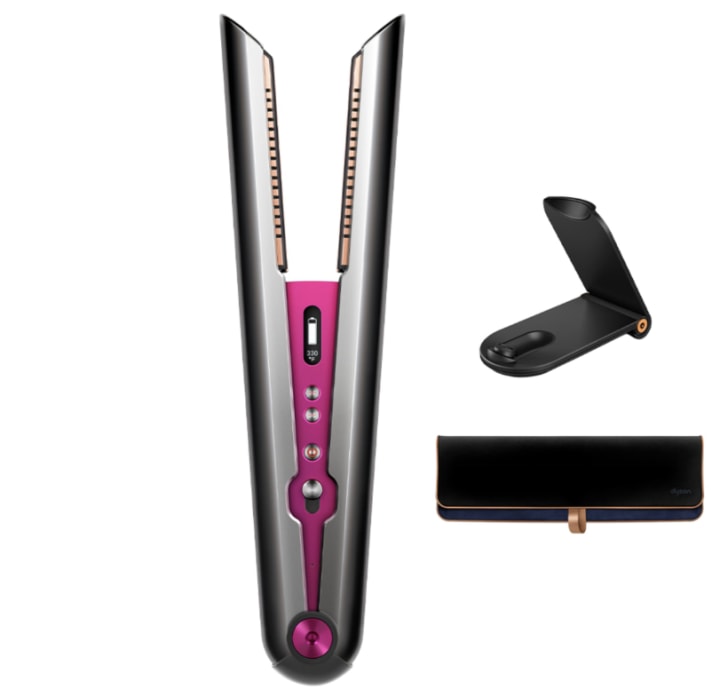
CHI Original 1-inch Digital Ceramic Iron
Shawn Harvey, hair stylist and owner of ShawnCutMaster Inc., recommended this tourmaline-infused ceramic iron from CHI. It takes 60 seconds to heat up to the maximum temperature of 425 degrees Fahrenheit and automatically shuts off after an hour of no use, according to the brand. “Its sleek design also makes it easy to straighten, curl or wave effortlessly,” Harvey says.
Plate type: Ceramic and tourmaline | Plate size: 1 inch | Heat settings: 5 | Digital display: Yes
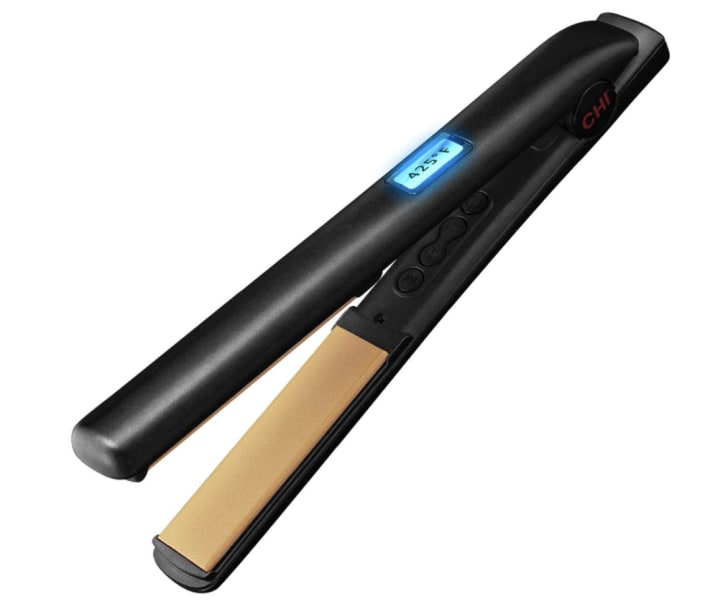
T3 Micro Lucea Straightening and Styling Iron
T3 is a quality high-end hair tool brand, according to Tina Malhotra, a stylist at Mia Wagner Salon in New York City. This highly rated option from the brand has nine heat settings that you can adjust using the built-in digital display. The flat iron also includes a smart microchip that monitors heat fluctuations and maintains a consistent temperature while in use, according to T3. The flat iron is available in both a 1-inch and 1.5-inch version.
Plate type: Ceramic | Plate size: 1 inch | Heat settings: 9 | Digital display: Yes
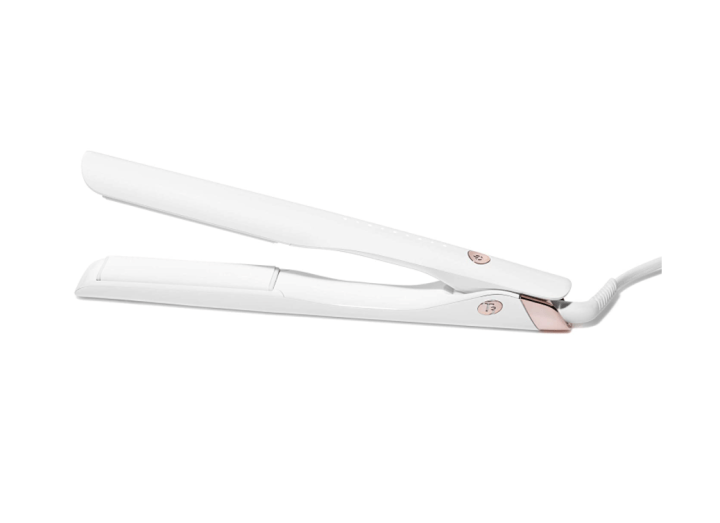
ghd Platinum+ Styler 1-inch Flat Iron
David Jones-Muñoz, a stylist and owner of Salon Dumbo in Brooklyn, says he keeps this flat iron from ghd handy and loves that it has a small curve to help create a beachy wave. Although this one does not have a digital display, it does reach a preset temperature of 365 degrees Fahrenheit and uses the brand’s smart technology to maintain that temperature throughout styling, according to ghd. The tool also automatically shuts off after 30 minutes of inactivity, according to the brand.
Plate type: Ceramic | Plate size: 1 inch | Heat settings: 1 | Digital display: No
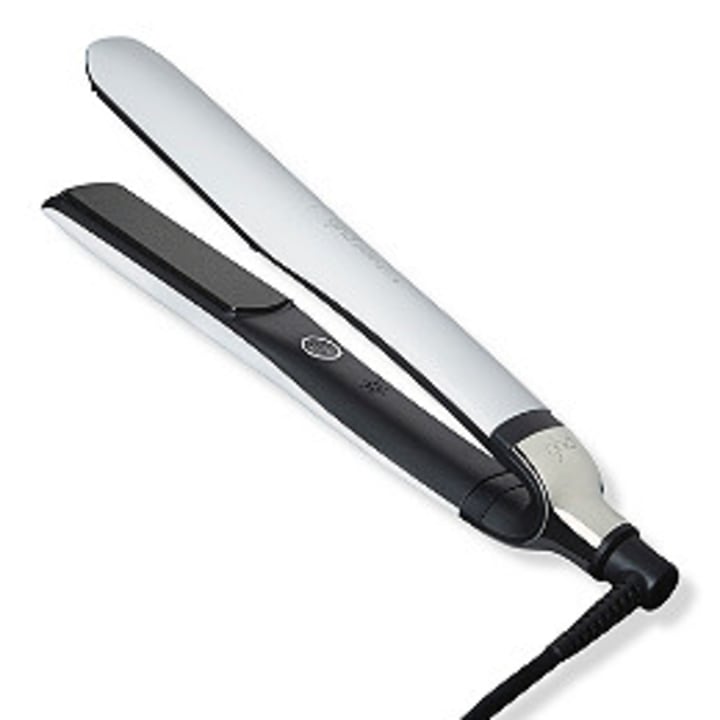
Paul Mitchell Express Smooth Ion & Ceramic Flat Iron
This flat iron from Paul Mitchell has an easy-to-read digital temperature display and can “heat up fast and cool quickly,” Harvey says. Its ceramic plates can heat up to 410 degrees Fahrenheit in 60 seconds, according to the brand. The flat iron also automatically shuts off after one hour for safety, as detailed on the Paul Mitchell website.
Plate type: Ceramic | Plate size: 1.25 inches | Heat settings: 8 | Digital display: Yes
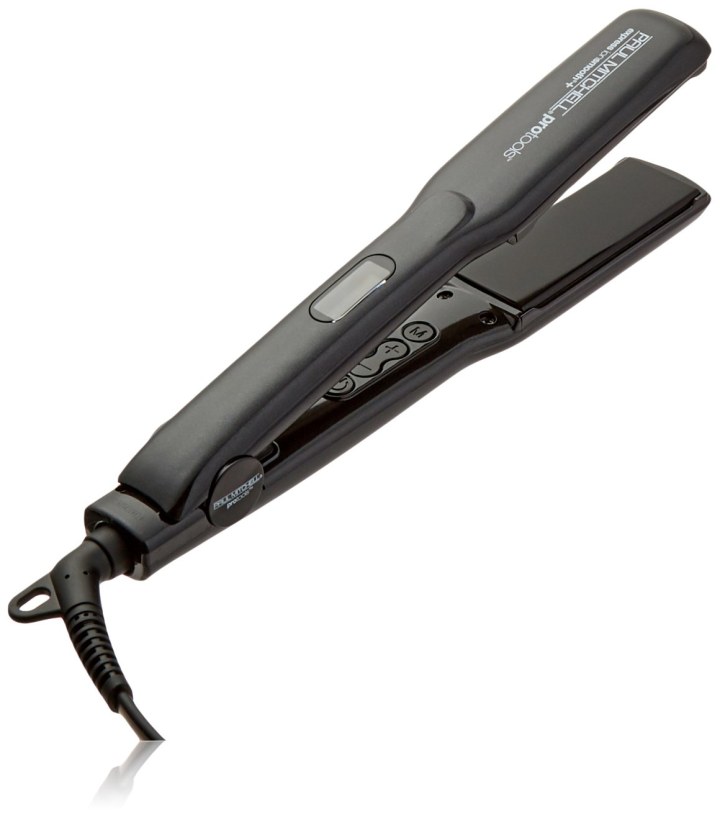
Cloud Nine Original Flat Iron
The Cloud Nine flat iron, recommended by London-based hair stylist Stefan Bertin, is available in three sizes: Micro (0.5 inches), Original (1 inch) and Wide (1.5 inches). It also has seven temperature settings ranging from 212 to 392 degrees Fahrenheit, which Bertin noted is “really helpful to pinpoint all hair types.” The ceramic plates are infused with minerals (including tourmaline), “so you get a gorgeous, snag-free glide,” Bertin says. The tool takes 20 minutes to reach its maximum temperature and automatically shuts off after 30 minutes of inactivity, according to the brand.
Plate type: Ceramic and tourmaline | Plate size: 1 inch | Heat settings: 7 | Digital display: Yes
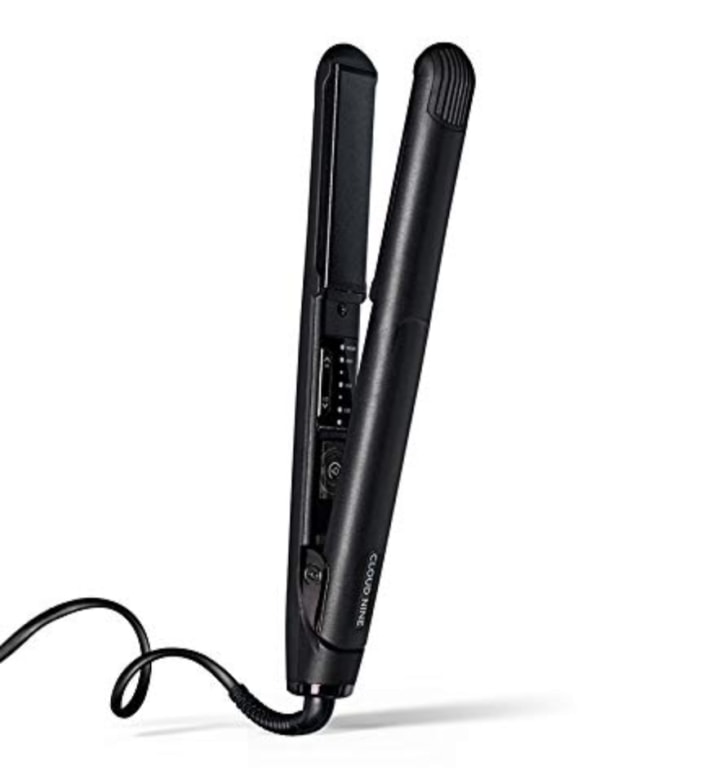
Paul Mitchell Neuro Smooth Titanium Flat Iron
Malhotra recommended this flat iron, which she says she has used at her salon for years. It offers 1.25-inch plates (the brand also makes a larger 1.5-inch version) and has rounded edges that can make it easier to style your hair, according to the brand. The flat iron heats up to 450 degrees Fahrenheit in 45 seconds, according to Paul Mitchell, and it equips a customizable auto shut-off setting that allows you to set a time up to 120 minutes for added safety. Rounded edges make it easy to add waves, curls or flips
Plate type: Titanium | Plate size: 1.25 inches | Heat settings: 4 | Digital display: Yes
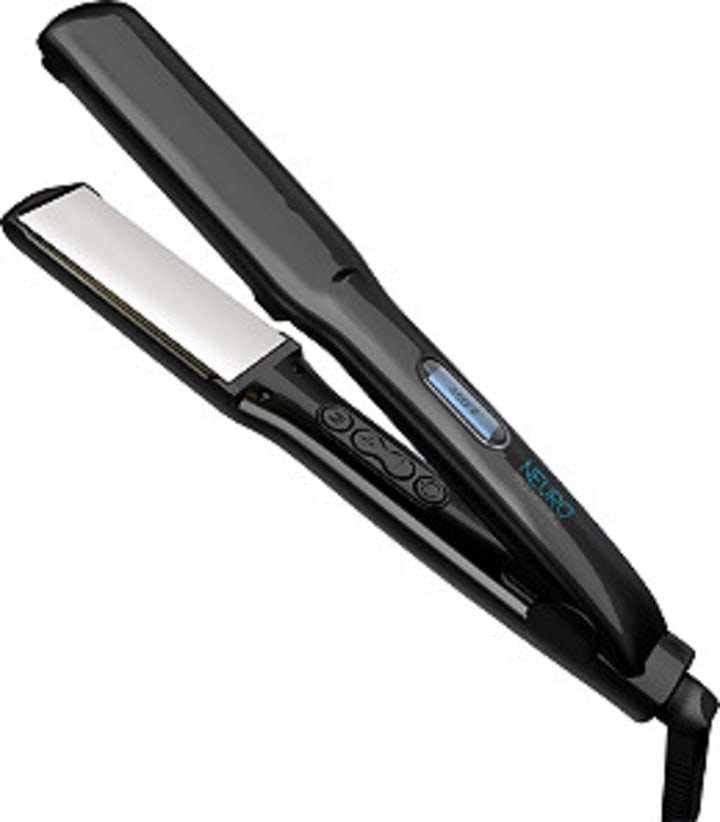
Creative Professional SCW 1-inch Styling Iron
Jones-Muñoz called this flat iron a “workhorse” and says he likes using it at his salon due to its thick, durable plates. He noted the temperature — which can be adjusted in five intervals and reaches 450 degrees Fahrenheit — works well for his clients, and he prefers the brand’s ceramic plates over titanium because it offers a better “pull” on the hair, making it easier to style.
Plate type: Ceramic | Plate size: 1 inch | Heat settings: 5 | Digital display: No
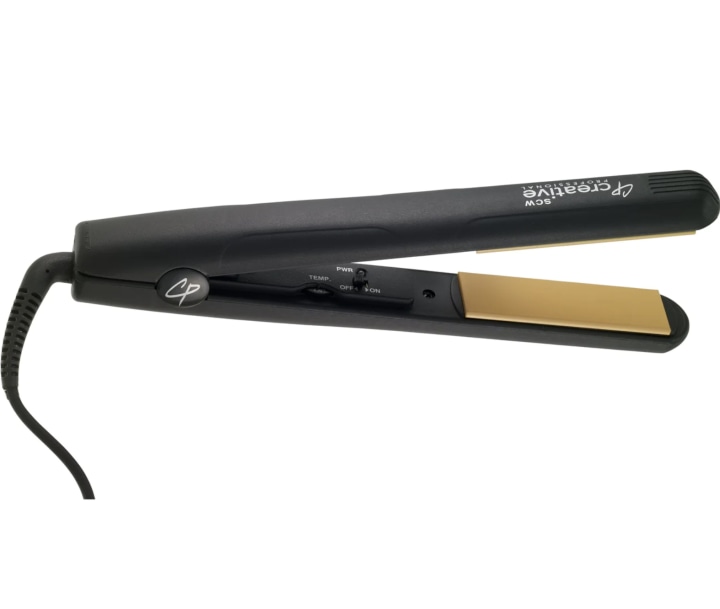
Ceramic vs. tourmaline vs. titanium flat irons
The three most common flat iron plates are ceramic, tourmaline and titanium. Each one will straighten hair, but different attributes make each more beneficial for certain hair textures, ranging from fine wavy hair to kinky coils.
Ceramic flat irons
Ceramic flat irons, which have ceramic-coated plates, are the most affordable option out of the three types of hair straighteners, according to Bertin. They don’t get as hot as titanium and tourmaline, which makes them “ideal for those with dry, damaged or fine hair,” he added. However, ceramic-coated plates often need to be routinely checked since the coating can wear and chip away, Malhotra says. When the metal beneath — usually aluminum — is exposed, it can cause damage to your hair, according to Bertin. Courtney Foster, a licensed cosmetologist and owner of Courtney Foster Beauty, says ceramic flat irons provide fairly even heat distribution, glide through the hair smoothly and leave behind a glossy sheen. However, both Foster and Bertin agreed that those with thick, coarse hair should pass on ceramic flat irons since they don’t typically reach high enough temperatures to straighten thicker hair.
Tourmaline flat irons
Tourmaline-coated plates are generally constructed from a tourmaline (a mineral) and ceramic blend that “offers an extra layer of protection and smoothness,” according to Hill. Tourmaline irons are the best of the three types, said Bertin, as their heat distribution means you’ll need fewer passes through your hair to get your desired straightening effect.
“Tourmaline plates are a step above the ceramic plates when hair type and texture are medium with loose waves and nominal frizz,” Hill says. She noted tourmaline provides a barrier to excessive heat and, as with most modern heating tools, “the ability to adjust the temperature settings makes this iron a great choice for the majority of hair types and textures.”
Titanium flat irons
Titanium is a strong, durable metal best suited for professional salon use on coarse thick, curly and coily hair. These plates typically heat up the quickest and more evenly distribute heat compared to ceramic plates, which allows for fewer passes over the hair, a smoother finish and “much better results than a ceramic iron,” Foster says. However, Hill told us titanium flat irons can cause the most damage to your hair and recommended avoiding these if you have fine or damaged hair.
“The heat transfer from titanium is intense, quick and, if used frequently or improperly, can create irreversible heat damage and breakage,” Hill says. She recommended “leaving titanium to the professionals” and touching up at home with a tourmaline or ceramic iron when needed.
How to shop for a flat iron
In addition to the plate materials noted above, our experts recommended looking at some additional features, including the size of the plates and a digital display to monitor the temperature.
Plate size and shape
“Smaller plates are better for short hair, whereas larger plates are better for longer hair,” says Bertin. He added that the plate size won’t really affect the finished product, but it will affect the speed at which you get there.
Jones-Muñoz is a fan of smaller 1-inch or 1.5-inch plates. He says once the plate gets to above 2 inches wide, there’s less versatility and less of a chance that you’ll move the straightener “quick enough without burning the hair.”
If you’re looking to use a flat iron for curls and beach waves, Jones-Muñoz also recommended flat irons with rounded edges that allow you to curl your hair onto the back of the straightener without much tug and pull.
Price
Flat irons vary in price based on multiple factors, including plate quality and material, size and brand recognition. To determine whether you should splurge on a straightener or save your money, you should figure out how many times you’ll be using it week to week.
“If you’re using it for a quick touch-up or once a month, then you could go with something that’s a little less expensive,” Jones-Muñoz says. More durable straighteners (like those with titanium plates) are on the pricier side, but they will be less likely to wear and chip with frequent use.
Digital display
Flat irons typically offer different ways to select and maintain your desired temperature — and some methods are easier to read than others. Our experts agreed that flat irons should equip a button or knob that easily displays the temperature you’re using, rather than limited settings. Harvey recommended flat irons with a digital display, which indicate the exact temperature the iron reaches and any fluctuations.
Do flat irons damage hair?
Our experts agreed that improper use, like utilizing a temperature too high for your hair type, can damage the hair. “Hair is a fabric and, like any material, heat can deteriorate and break down the hair structure,” Hill says. The cuticle — the outer layer of a hair strand — can “very easily” become damaged by heat over 356 degrees Fahrenheit or 180 degrees Celsius. Damaging that cuticle layer will make your hair more porous, which means it will struggle to hold on to moisture, causing dryness and breakage.
Determining the safest heat setting depends on your hair type and texture, according to Foster. “Thick hair can use a higher setting while thin hair should use a lower heat setting,” she explained. Experts emphasized that you should always use a flat iron in quick passes on low or medium temperature and you should always use some kind of heat protectant when using any hot tool. Severe damage is likely “irreparable and has to be grown out,” Bertin says.
Although hair straighteners are safe to use when used properly, the hair stylists we consulted advised against using flat irons — or any hot tool — every day.
“Even with the best heat protectants in the game, heat is not something you should be exposing your hair to every day,” Bertin told us. Those with afro-textured hair, for example, should consider flat ironing their hair at most once a week because “our hair is naturally more fragile and dry, so flat ironing any more than that is a huge no-no,” Bertin says.
Meet our experts
At Select, we work with experts who have specialized knowledge and authority based on relevant training and/or experience. We also take steps to ensure that all expert advice and recommendations are made independently and with no undisclosed financial conflicts of interest.
Why trust Select?
Mili Godio is an editor at Select who has written a variety of beauty and skin care stories, including tinted moisturizers, dry shampoos and dark circles treatments. For this article, Godio spoke to seven hair care experts about what to look for when shopping for a flat iron and rounded up their favorite ones to shop.
Catch up on Select’s in-depth coverage of personal finance, tech and tools, wellness and more, and follow us on Facebook, Instagram and Twitter to stay up to date.
اكتشاف المزيد من ينبوع المعرفة
اشترك للحصول على أحدث التدوينات المرسلة إلى بريدك الإلكتروني.
